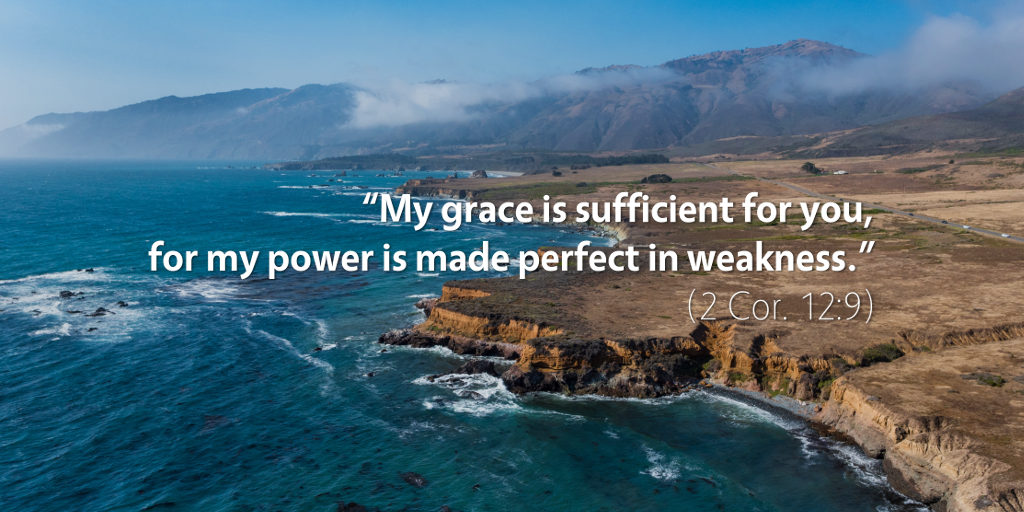Great Promises of the Bible: 2 Corinthians 12:9

Great Promises of the Bible
Lt. Colonel Allen Satterlee
Spiritual Life Officer
USA Southern Territory
He said, “My grace is all you need. My power works best in weakness.” So now I am glad to boast about my weaknesses, so that the power of Christ can work through me” (2 Corinthians 12:9).
Blind, but Not Broken
His body was bruised, bent by age, and breaking down. After a rigorous life of travel and leadership, heartbreak and triumph, the aged William Booth, Founder of The Salvation Army, now faced the loss of his eyesight. The only possible solution was high risk surgery that if it failed, would leave him totally blind. But thinking that this was no time to retreat or retire, the aged warrior submitted to the procedure. It failed. He was blind.
His son and second-in-command, Bramwell, broke the news to his father. His biographer, Harold Begbie, shares the touching scene:
“’You mean that I am blind?’
“’Well, General, I fear that we must contemplate that.’
“After a pause the old man said, ‘I shall never see your face again?’
“’No, probably not in this world.’
“During the next few moments the veteran’s hand crept along the counterpane to take hold of his son’s, and holding it said very calmly, ‘God must know best!’ and after another pause, ‘Bramwell, I have done what I could for God and for the people with my eyes. Now I shall do what I can for God and for the people without my eyes.’”
Thorn in the Flesh
 A new instance of God’s grace was shown to William Booth in that moment of need. Centuries earlier, Paul also struggled with something so painful and so personal that in speaking of it he chose to cloak it as a “thorn in the flesh.” The words he used help us understand what torment this was.
A new instance of God’s grace was shown to William Booth in that moment of need. Centuries earlier, Paul also struggled with something so painful and so personal that in speaking of it he chose to cloak it as a “thorn in the flesh.” The words he used help us understand what torment this was.
The word for thorn was the same used for a large Palestinian thorn but the term could refer to anything from a simple splinter to a large stake, such as was used in crucifixion. Given the context, Paul was not referring to an annoying splinter but something that caused him great discomfort on an ongoing basis. It would not go away. He could not get used to it. The throbbing was sharp and it was unending.
What was this thorn? Speculation has run the gamut over the centuries and to the present day. Some think that the thorn was some enemy that dogged Paul, or perhaps a family member who made his life miserable. Others think it was a physical ailment, especially centering on his eyesight or a recurring disease like malaria. Still others think it might have been a secret disappointment that woke him at night or invaded his thoughts during idle moments. Like Moses denied entry into the Promised Land, Paul could see the solution but could not reach it.
When Suffering is Unavoidable
As with anyone else, Paul wanted the ache to stop. Christians are not called to be Stoics who deny pain exists or pretend they are not suffering. To groan, to weep, to grow impatient with a body or a disease is part of coping with what we cannot control. And so he, who had been the instrument of healing for so many, prayed that he would find relief. He prayed. And he prayed. And he prayed again.
the instrument of healing for so many, prayed that he would find relief. He prayed. And he prayed. And he prayed again.
God’s answer to him was as disappointing as it was firm. NO. The Greek tense Paul uses to describe God’s answer is in the perfect tense, “indicating that the decision continues to stand” (Beacon Bible Commentary). Being in the will of God, being filled by His Spirit does not mean that we will not have to endure great suffering. We are human beings in human bodies that are subject to genetic disease, aging, injury. Being a Christian does not allow us to put on a cape like Superman, jet across the skies and laugh as bullets bounce off our chests. We hurt, we grow feeble and we eventually die.
Sufficient Grace
Given that the problem is not removed, what now? Through the shouts of Paul’s pain and agony, God’s voice can still be heard: “My grace is all you need. My power works best in weakness.” This grace is not for ones who want to wallow in their current setback in an effort to elicit sympathy and attention but for those who want to keep on living and keep on doing and keep on being all that God wants.
There are two ways to make a burden lighter. The first is to remove the burden. The second is to increase strength so that lifting it is not as difficult. The grace spoken of here is that strengthening of our spiritual reserves, building our soul’s muscles so we can take the next step and the next step.
and the next step.
The grace is in always in operation but works best in weakness. The true measure of heroism cannot be known until the battle is hottest and the soldier must decide that his life is not greater than the cause for which he fights or his safety not more important than the rescue of the comrade who has fallen in no man’s land. The true measure of a parental love cannot be known until the helpless child requires his parent to deny every hope, exhaust every resource, risk life itself for the rescue of that little one. And God’s grace cannot be known more fully until that thing that threatens us approaches as a hungry lion and we have no place to run. Our weakness, our absolute helplessness becomes the stage to display God’s enabling grace. So the dying saint has found. So has the martyr standing before his executioner. So also, the lone believer who confesses his faith amid humiliation and scorn.
Sufficient grace. We need nothing less. We could want nothing more.
Our Corporate Prayer
Dear Heavenly Father, I hate pain. I know it's part of life and I know sometimes it's the best option like when I have to have surgery to get better. But I still hate it. And I admit that sometimes because I hate it I sometimes make bad choices to avoid it. But help me to know that when You don't take away the pain it isn't because You don't love me. You have reasons to allow pain to be in my life even if I don't understand it. Help me to trust You. Help me to lean on You and believe that You will give me the strength that I need to meet the pain when it comes and to trust You through it. I still don't like it but I really love You. That's where I want to let things rest. In Jesus' name. Amen.
Our Worldwide Prayer Meeting
Sri Lanka Territory
Think it Through
Were there times when you faced pain that afterwards you realized that it was the only way forward? What did God teach you in that? What would you say to someone facing something similar?
Notable Quotables
Forgive me, Lord, for being so slow to thank You for this pain. Perhaps it was because I've really only felt thankful as the pain endured. At first, my faith was shining, and I believed the pain would soon pass. Then when in lingered, when the night of pain was long and no star of healing gleamed, my faith seemed to dim. But it was there in the darkness of the suffering that I saw how tenderly a star can glow. Lord, thank You for my pain that let me see the glory of Yourself. You came so close to me, Lord, and though I still hurt, the healing balm of Your love, bringing courage and strength to endure, is easing my pain. - Colonel Virginia Talmadge
https://www.youtube.com/watch?v=OXqs7TORCAY
This old, old hymn is calming as it reminds us of healing in Christ. "There is a Balm in Gilead."
We would appreciate any feedback and/or suggestions on how to improve these devotionals. Please email comments to: SpiritualLifeDevelopment@uss.salvationarmy.org or by going to our website: https://southernusa.salvationarmy.org/uss/spiritual-life-development.
We would love to hear from you.
Lt. Colonel Allen Satterlee
Territorial Spiritual Life Development Officer/THQ Chaplain
USA Southern Territory
